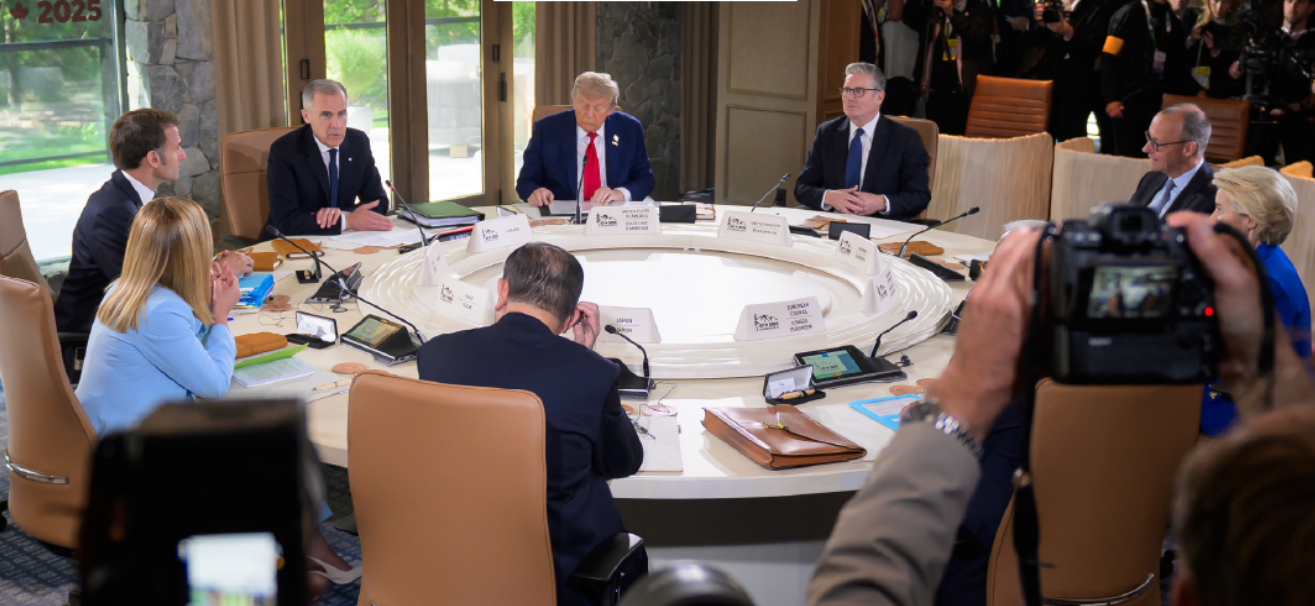President Trump Leaves G7 Early:President Trump abruptly leaves the G7 summit amid the growing Israel-Iran conflict, taking a swipe at French President Emmanuel Macron. In a sharp remark, Trump says, “Emmanuel always gets it wrong,” as disagreements over the path to de-escalation dominate the summit. While Trump backs Israel and hints at future US actions, G7 leaders push for diplomacy, exposing deep divisions among global power
President Trump Leaves G7 Early
US President Donald Trump has decided to leave the G7 summit early amid the rapidly escalating conflict between Israel and Iran. Trump announced his early departure, stating, “I have to be back. Very important. I want to just thank our great host. Thank you, Canada. But you probably see what I see and have to be back as soon as I can.” Following a day of discussions with other G7 leaders emphasizing the importance of a negotiated settlement, Trump used his Truth Social platform to express strong support for Israel and issued a stern warning directed at Iran.
President Trump says:
Publicity seeking President Emmanuel Macron, of France, mistakenly said that I left the G7 Summit, in Canada, to go back to D.C. to work on a “cease fire” between Israel and Iran. Wrong! He has no idea why I am now on my way to Washington, but it certainly has nothing to do with a Cease Fire. Much bigger than that. Whether purposely or not, Emmanuel always gets it wrong. Stay Tuned!
Shortly after Trump’s social media statements, the White House press secretary confirmed that Trump would return to Washington late on Monday, cutting short his trip by a day. His early departure means he will miss important scheduled meetings with leaders from Ukraine and Mexico. While Trump refrained from clearly stating whether the US would directly engage militarily alongside Israel, he emphasized that the United States had not been involved in the initial strikes. However, he hinted at possible future actions without providing specifics, saying that the US would “be doing something” after his return from the G7 summit.
Speaking to reporters, Trump remained optimistic that Iran would eventually sign a new nuclear agreement. He recounted his past dealings with Iran, noting, “I gave Iran 60 days and they said no and the 61st you saw what happened.” Trump expressed confidence that ongoing talks, even over the phone, might lead to an eventual deal, though he emphasized that face-to-face discussions are always more effective.
Notably, Trump refused to endorse a draft joint statement prepared by the G7 leaders, which called for de-escalation between Israel and Iran. Meanwhile, French President Emmanuel Macron publicly supported the idea of a ceasefire, urging both sides to halt strikes, especially those targeting civilian areas, energy, administrative, and cultural infrastructure. Macron stated that France would back any US-brokered ceasefire, emphasizing that civilian casualties and infrastructure attacks are completely unjustifiable.
British Prime Minister Kier Starmer echoed concerns about Iran’s nuclear program but stressed the collective desire for de-escalation among G7 leaders. He acknowledged Israel’s right to self-defense but emphasized the need to find diplomatic solutions to the growing crisis.
In a significant divergence from its Western allies, Japan condemned Israel’s strikes on Iran, calling them “completely unacceptable and deeply regrettable,” citing its long-standing historical relations with Tehran.
Expert voices have added to the chorus of concern. Peter Khnik and independent journalist Antony Lewenstein highlighted the complexity and dangers of the current escalation. Lewenstein criticized Israeli Prime Minister Benjamin Netanyahu, calling him a “menace to world peace” and pointing out that the International Criminal Court has an active warrant for his arrest. He argued that Israel’s recent attacks were unprovoked and based on unfounded claims of Iran imminently developing a nuclear weapon. According to Lewenstein, even US assessments months earlier found no evidence of Iran advancing a nuclear weapons program.
He further alleged that the US may have played a role in supporting Israel’s defense against Iran’s retaliatory strikes, even if not directly involved in offensive military action. Lewenstein argued that while Trump postures as a potential peacemaker, his policies and alliances have contributed to the escalation. He also criticized the unrealistic warnings for 10 million Tehran residents to evacuate amid ongoing strikes, noting that such displacement under active bombardment is impossible.
The situation remains highly volatile, with diplomatic efforts ongoing amidst the risk of further military escalation. While some see Trump as possibly the only figure capable of negotiating an end to the crisis, his actions and rhetoric continue to generate controversy and skepticism globally.

